Best of #econtwitter - Week of April 18, 2021
Apr 19, 2021
Welcome readers old and new to this week’s edition of Best of Econtwitter. Thanks to those sharing suggestions, over email or on Twitter @just_economics.
Paper summary threads

Dean Eckles@deaneckles
Are "behavioral" phenomena — such as cognitive biases — just something that crops up in low-stakes settings?
This new paper adds to the evidence that often the answer is "no". Here "high incentives" amount to more than a participant's monthly income:

3:51 PM · Apr 14, 2021
29 Reposts · 126 Likes

Alexander Berger@albrgr
Crazy stat: aging into legal driving age increases *total mortality risk* for teenagers by 15% julianreif.com/research/reif.…
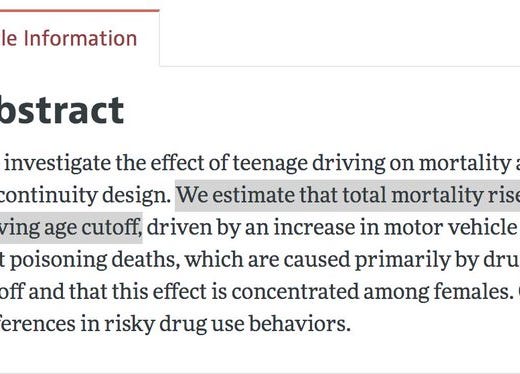
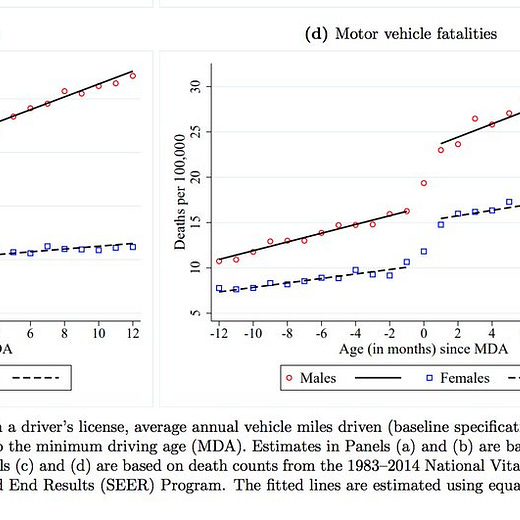
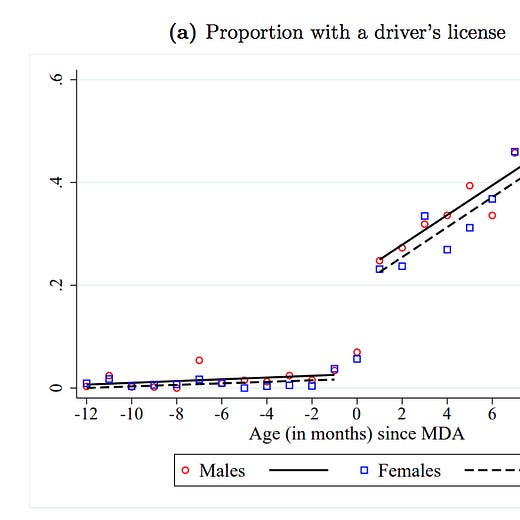

AEA Journals @AEAjournals
Forthcoming in AER: Insights: "Teenage Driving, Mortality, and Risky Behaviors" by Jason Huh and Julian Reif. https://t.co/LfqyHVCcyI
4:24 PM · Apr 13, 2021
41 Reposts · 191 Likes

Guo Xu@guoxu_econ
We link voter registration data to personnel records of nearly the ENTIRE federal government. We establish 3 facts: #1 while presidents use political appointments to align ideology, there are no political cycles in the career civil service – the bureaucracy works as designed.
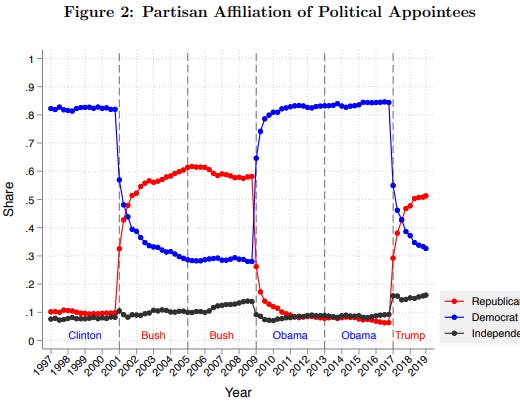
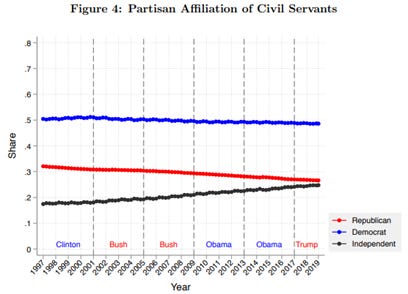
6:02 AM · Apr 12, 2021
2 Likes

Guo Xu@guoxu_econ
#3 Misalignment creates significant costs. Looking at procurement officers across the bureaucracy, we find greater cost overrun for contracts processed under misalignment. We provide evidence suggestive of a negative "morale effect", whereby misaligned officers are less motivated
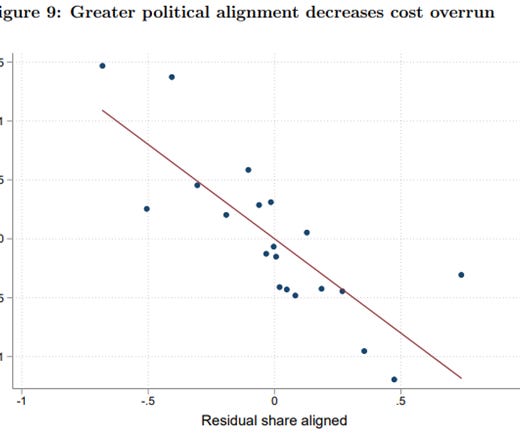
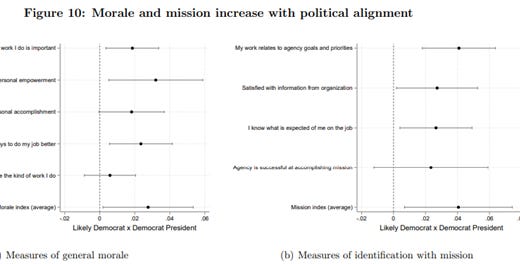
6:02 AM · Apr 12, 2021
4 Likes

Peter Nencka 📊@peternka
Short version: library capital investment increases library use, particularly for children.
Capital spending also leads to improvements in nearby students' reading test scores.
Left: log children's circulation. Right: Reading scores (std dev)


5:52 PM · Apr 12, 2021
1 Repost · 14 Likes

Maya Rossin-Slater@maya_rossin
New paper 🧵:The US is the only OECD country w/out national paid family leave, and concern about employer costs is a central roadblock. In our new @nberpubs wp, we surveyed employers in NY & PA in the 2 yrs before & after NY’s PFL policy went into effect. We find NY employers 1/3
4:58 PM · Apr 12, 2021
51 Reposts · 179 Likes

Advik Shreekumar@AdvikSh
In light of the US calling for a pause on the J&J vax, I wanted to re-up our new paper about changing guidance and trust in government.
We find that emphasizing changes in the government’s position can reduce the influence of government announcements on people’s beliefs.
(1/n)

Journal of Public Economics @JPubEcon
Trump switched between downplaying coronavirus and acknowledging it. Highlighting Trump’s changing attitudes damages government credibility.
Experiment participants update beliefs less when shown CDC projections and report lower trust in the government’s coronavirus response. https://t.co/3GGxn4Xlzv
6:34 PM · Apr 13, 2021
2 Reposts · 11 Likes

Dan Morgan@dr_dmorgan
summary:
Clinicians widely overestimated chance of disease especially after testing
Cardiac ischemia after + ECG—EBM 2-11%, median answer 70%
UTI after + urine cx—EBM 0-8.3%, answer 80%
Breast CA after + mammo—EBM 3-9%, answer 50%
Pneumonia after + CXR EBM 46-65%, answer 95%
5:56 PM · Apr 12, 2021
21 Reposts · 46 Likes

Florian Ederer@florianederer
Don't tell the Habsburgs and their kin/chin
anderson.ucla.edu/faculty_pages/…




Popular Science @PopSci
Go ahead, marry your cousin—it’s not that bad for your future kids https://t.co/S38Q4r4uxj https://t.co/JqxJfwnlZj
8:43 PM · Apr 13, 2021
13 Reposts · 103 Likes

Garrett Johnson@garjoh_canuck
🤔DO ADS ACTUALLY WORK?🤔
🧵We tackle this question using a large collection of display ad field experiments in a working paper with @EconInformatics & @enub
"The Online Display Ad Effectiveness Funnel & Carryover: Lessons from 432 Field Experiments”
ssrn.com/abstract=27015… 1/8

5:50 PM · Apr 15, 2021
31 Reposts · 110 Likes

Megan Stevenson@MeganTStevenson
I want to share a methodological approach that @AOUSS and I used in our (newly revised!) paper on cash bail. It’s a method of identifying racial disparities in policy implementation that I think might be useful to others. (Long thread) 1/
papers.ssrn.com/sol3/papers.cf…

1:19 PM · Apr 15, 2021
19 Reposts · 66 Likes

Gabriel Zucman@gabriel_zucman
Excited that our paper (with E. Saez), “A Wealth Tax on Corporations’ Stock”, is now out!
Idea: a tax of 0.2% on the market value of big companies
- Hard to avoid
- Firms can pay by issuing shares (if they lack liquidity)
- Raise $180 billion annually
gabriel-zucman.eu
4:29 PM · Apr 18, 2021
80 Reposts · 282 Likes
^Sylvain Catherine comments: “an increment of 0.2% in cost of capital reduces market value by 14%”

Patrick Kennedy@kennedy_patk
New working paper with my co-author @hbwheel w/ first available evidence from tax records on Opportunity Zones:
- How responsive are investors?
- Which neighborhoods receive investment?
- New tract-level panels based on IRS microdata
>> thread

4:54 PM · Apr 13, 2021
40 Reposts · 141 Likes
More: social discount rate; debt crisis theory, labor rationing, decline in US net foreign asset position
Interesting discussions

Matt Clancy@mattsclancy
This @Noahpinion piece has generated a lot of discussion. An ongoing thread of interesting reactions from #EconTwitter https://t.co/ViSUyWpbWJ

Noah Smith 🐇 @Noahpinion
Climate economics could have contributed a huge amount to the discussion on climate change.
Instead, it has contributed very little, and the Biden administration is basically ignoring it.
In this post, I explore the reasons why.
https://t.co/IDCLo714Qr
6:18 PM · Apr 13, 2021
4 Reposts · 10 Likes

Ryan Hill@RyanReedHill
Econ PhD advice thread: @carolyn_sms and I co-wrote our job market papers, so we often get asked about the pros and cons of co-authoring with grad school peers. Now that we both have survived the market, I wanted to tweet out a few reflections on our experience.
7:40 PM · Apr 14, 2021
95 Reposts · 686 Likes

Jason Furman@jasonfurman
This thread itself is 37 more tweets on inflation than I did in three and a half years at CEA.
Times have changed.

Council of Economic Advisers @WhiteHouseCEA
In the next several months we expect measured inflation to increase somewhat, primarily due to three different temporary factors: base effects, supply chain disruptions, and pent-up demand, especially for services. 1/
1:37 PM · Apr 12, 2021
24 Reposts · 164 Likes

Danila Serra@danilaserra_eco
#econtwitter: if you are the primary editor of an economics journal (not top but good), overseeing hundreds of submissions per year, what kind of support do you receive from your department? Teaching reductions? Graduate assistant? Anything?! (Asking for a friend)
6:14 PM · Apr 15, 2021
16 Reposts · 111 Likes

Kevin J.S. Zollman@KevinZollman
So the NYer retweeted this old article today, and it's causing some consternation on #EconTwitter. I thought I would take the opportunity to discuss issues about testability and game theory. (Something I've thought about quite a bit.)

The New Yorker @NewYorker
Nash-influenced game theory isn’t a testable scientific theory but an intellectual tool—a way of organizing our thoughts and applying them in a consistent manner. https://t.co/eiIGfe9ANV
2:58 PM · Apr 17, 2021
48 Reposts · 161 Likes

Jialan Wang@jialanw
We should do hackathons in economics. E.g. a bunch of researchers get together + analyze a dataset for a couple of days, and present and share the results. Maybe this could work for theory too?
Would be a nice break from the 100-page paper / 6-year publication lag equilibrium.
6:59 PM · Apr 16, 2021
102 Reposts · 1.08K Likes

David Albouy 🇺🇸🇫🇷(🇨🇦)🌐@albouy
Folks have been curious about what I found replicating papers
While I believe in showing grace, respect, and due scientific process before naming names, here is a (slightly snarky) thread on 10 things I’ve learned through #replication
Remember we are all prone to error (1/12)
6:05 PM · Apr 15, 2021
84 Reposts · 327 Likes

Patrick Adams@PatrickAdams21
Last year I rewrote the bar scene from Good Will Hunting, except that Clark is a finance PhD student.
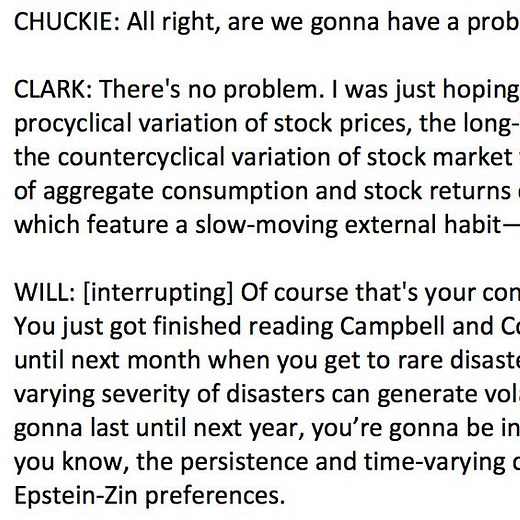
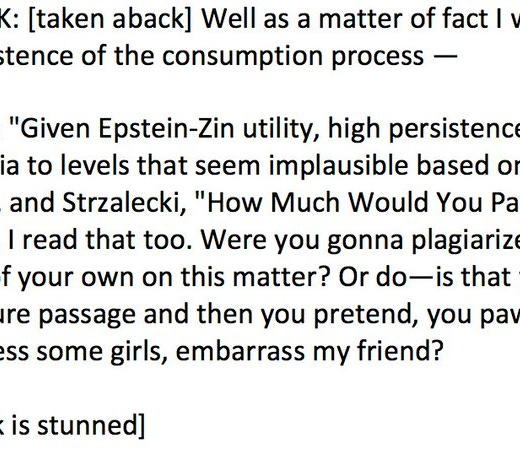
9:56 PM · Apr 10, 2021
45 Reposts · 347 Likes

